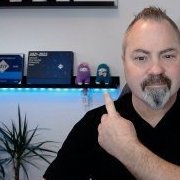-
Posts
9208 -
Joined
-
Last visited
-
Days Won
367
Everything posted by anyweb
-
it's more than likely forcing to GPT due to the bios mode being in UEFI, and that's a good thing, looking at the small snippet of log file you provided doesn't really help troubleshoot this however, we need the entire smsts.log to be sure what is being detected, and then, what steps are running, so can you attach it please
-
I see you are using french, have you tried the equivalent word in French in case that's the issue ?
- 242 replies
-
- 1702
- forced upgrade
-
(and 2 more)
Tagged with:
-
hi can you show the step in your task sequence please
- 242 replies
-
- 1702
- forced upgrade
-
(and 2 more)
Tagged with:
-
training is always good but intense, and these types of training give you good info over the time frame of about a week, but what they don't give you is experience. That you get when working with SCCM in different organizations over the years, so don't expect to be an all singing, all dancing SCCM engineer after attending one of these courses for one week, sure, these courses will give you a great overview of the product, but SCCM is WAY TOO immense to understand or fully comprehend in just one week IMHO, I'd suggest you bookmark this link and start working your way through the guides to get familiar with various options in SCCM Current Branch (and technical preview) cheers niall
-
hi Thomas, I didn't create any separate discs for temp and transaction logs and didn't add it to the scripts either, that would be an exercise for you to undertake, p.s. you should really be working off the latest version of the guide here > How can I install System Center Configuration Manager (Current Branch) version 1802 on Windows Server 2016 with SQL Server 2017 – Part 1
-
so have you actually tried putting something together yet ? there is a frontends and hta's section here for some ideas... https://www.windows-noob.com/forums/forum/98-frontends-htas-and-web-services/
-
do you have any 3rd party antivirus software that could be causing the download to fail ? or a proxy ? Failed to verify redist file for update C:\Program Files\Microsoft Configuration Manager\CMUStaging\0F11CAA4-7F7F-454B-96D6-75F427D015CE\redist\ConfigMgr.Manifest.cab CONFIGURATION_MANAGER_UPDATE 26.05.2018 19:59:02 26012 (0x659C)
-

Problem deploy OS on computer that has 2 or more disks
anyweb replied to Scripteur's topic in Configuration Manager 2012
(New-Object -COMObject Microsoft.SMS.TSEnvironment).Value('OSDDiskIndex') = $MonDisk.Disk }" returned 0 doesn't look like it's an error, have you tried to dump the variables created to verify it it set's the variable at all ? i'd suggest you pause the task sequence before and after the step to verify -

Pushing out task sequence to new machines
anyweb replied to clush's question in Zero Touch/ZTI, Lite Touch/LTi
hi Craig you should be very careful with required task sequences and instead of limiting to All Systems, make it much safer, for example limit it to All Dell 3620 precisions, or some other small subset of computers, that way if you make a mistake with a query, only those computers will be affected, by limiting to All Systems, if you make a query mistake in that collection and it add's say... All Systems (select * from sms...) then you have just wiped out your entire organization including servers with that required task sequence, secondly, check that the computer you are testing in, is in the collection that is targeted with the task sequence thirdly, is the task sequence deployed to Only Configuration Manager clients, or PXE or something else ? if you want the required ts to start in Windows then you need it to be made available to Only Configuration Manager Clients... cheers niall -
it's failing to talk to the USMT State Migration Point, is that configured ? <![LOG[Error. Status code 500 returned]LOG]!><time="07:22:00.631-480" date="05-21-2018" component="OSDSMPClient" context="" type="0" thread="4276" file="libsmsmessaging.cpp:9551"> <![LOG[Received 1164 byte response.]LOG]!><time="07:22:00.631-480" date="05-21-2018" component="OSDSMPClient" context="" type="0" thread="4276" file="smpclient.cpp:2376"> <![LOG[pReply != NULL, HRESULT=80004005 (e:\nts_sccm_release\sms\client\osdeployment\osdsmpclient\smpclient.cpp,2391)]LOG]!><time="07:22:00.631-480" date="05-21-2018" component="OSDSMPClient" context="" type="0" thread="4276" file="smpclient.cpp:2391"> <![LOG[SMP Root share info response is empty]LOG]!><time="07:22:00.631-480" date="05-21-2018" component="OSDSMPClient" context="" type="3" thread="4276" file="smpclient.cpp:2391"> <![LOG[ClientRequestToSMP::ClientRootShareRequestToSMP failed. error = (0x80004005).]LOG]!><time="07:22:00.631-480" date="05-21-2018" component="OSDSMPClient" context="" type="3" thread="4276" file="smpclient.cpp:2442"> <![LOG[ExecuteRootShareInfoRequest(sRootShareList), HRESULT=80004005 (e:\nts_sccm_release\sms\client\osdeployment\osdsmpclient\smpclient.cpp,1717)]LOG]!><time="07:22:00.631-480" date="05-21-2018" component="OSDSMPClient" context="" type="0" thread="4276" file="smpclient.cpp:1717"> <
Failed to install applications during task sequence
anyweb replied to JSlay33's topic in Configuration Manager 2012
it's failing to install the apps, check your appenforce.log to see what it says -

Failed to install applications during task sequence
anyweb replied to JSlay33's topic in Configuration Manager 2012
can you attach the smsts*.log (zip them up) -

Failed to install applications during task sequence
anyweb replied to JSlay33's topic in Configuration Manager 2012
the error means Required management point not found Source: System Center Configuration Manager ----- are you specifying something in relation to MP in the setup windows and configmgr step (in installation properties) ? what do the App*.log files reveal ? -

Configuring BitLocker in Intune - Part 2. Automating Encryption
anyweb replied to anyweb's topic in Microsoft Intune
did you look at the youtube video showing you how to test this ? here it is -

Problem deploy OS on computer that has 2 or more disks
anyweb replied to Scripteur's topic in Configuration Manager 2012
yup works ok for me, so before we go any further, can you explain where you got the error's you posted, and what happens when you run the code pasted directly above this reply on that machine (and not in the task sequence), does it produce an error, or not, or, do you only see an error when you run the script via the task sequence


